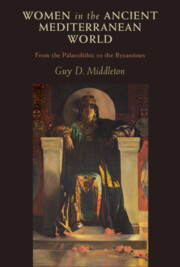Book contents
- Women in the Ancient Mediterranean World
- Women in the Ancient Mediterranean World
- Copyright page
- Dedication
- Epigraph
- Contents
- Preface
- Acknowledgements
- Timeline
- Historical Contexts
- Introduction
- Part I The Deep Past
- Part II The Bronze Age
- Part III The Iron Age
- 12 Naunakhte
- 13 Herse
- 14 Pkpupes
- 15 Atossa
- 16 The Princess of Vix
- 17 Aristonice
- 18 Neaira
- 19 Phanostrate
- Part IV The Hellenistic Worlds
- Part V The Age of Empire
- Notes
- Select Bibliography
- Index
14 - Pkpupes
from Part III - The Iron Age
Published online by Cambridge University Press: 19 January 2023
- Women in the Ancient Mediterranean World
- Women in the Ancient Mediterranean World
- Copyright page
- Dedication
- Epigraph
- Contents
- Preface
- Acknowledgements
- Timeline
- Historical Contexts
- Introduction
- Part I The Deep Past
- Part II The Bronze Age
- Part III The Iron Age
- 12 Naunakhte
- 13 Herse
- 14 Pkpupes
- 15 Atossa
- 16 The Princess of Vix
- 17 Aristonice
- 18 Neaira
- 19 Phanostrate
- Part IV The Hellenistic Worlds
- Part V The Age of Empire
- Notes
- Select Bibliography
- Index
Summary
The Amazons are one of the best-known peoples of antiquity – though long thought to be mythical. They appear in book three of the Iliad, from the later eighth or seventh century bc, where they are given the epithet ‘a match for men’; the word ‘Amazon’ is still used to refer to fierce or powerful women. The Amazons were warrior women who legend had it would cut off a breast to enable them to better use their bows – the fifth-century bc Greek historian Hellanikos thought ‘Amazon’ could be read etymologically as ‘a’, ‘without’, ‘mazos’, ‘breasts’ (mastos in Greek).1 Others thought it could be read as without ‘barley’, ‘maza’, and referred to the fact that Amazons did not farm in the way that civilised settled people would. In Airs, Waters, Places, the physician Hippocrates recorded that Sarmatian women burnt the right breast of their baby girls to divert power into their right arms – making them stronger fighters. Such myths about these exotic women in a society where ‘proper’ gendered roles were reversed abounded amongst the Greeks and Romans, Amazon specialist Adrienne Mayor tells us. An alternative and possibly more likely origin for the name comes from old Iranian ‘ha-mazon’ – ‘warriors’. But it may be fruitless to search for meaning in the name – what would a future etymologist make of ‘American’?
- Type
- Chapter
- Information
- Women in the Ancient Mediterranean WorldFrom the Palaeolithic to the Byzantines, pp. 125 - 131Publisher: Cambridge University PressPrint publication year: 2023



